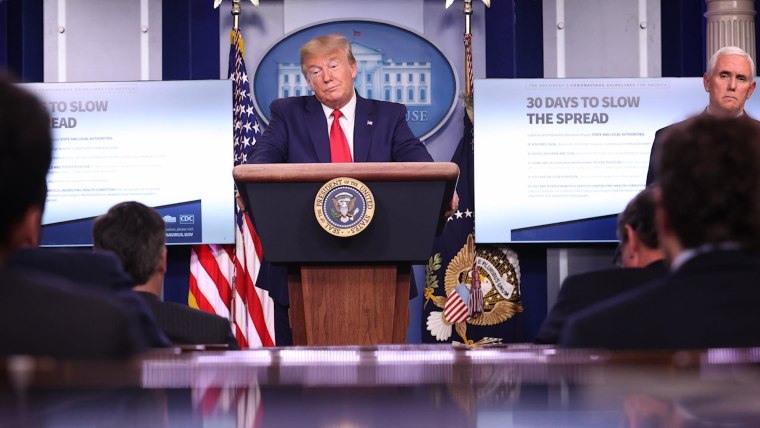China will likely be the next foreign power accused of undermining a U.S. presidential election — it just doesn’t know it yet. The Trump administration, through words and deeds, appears to be grooming the American voter to accept an eventual assertion that China sabotaged the 2020 election if the outcome doesn’t go President Donald Trump’s way.
At the president’s Rose Garden news conference Tuesday, as in other public comments over the last few months, Trump bashed China, painted former Vice President Joe Biden as a “gift to communist China” and raised the specter of massive mail-in ballot fraud in November.
These distinct elements are neither isolated nor random. Their increasingly frequent juxtaposition signals a potential prophylactic strategy in the making. The seeds of such a strategy were sowed during the onset of the coronavirus in the late winter and continued to be cultivated in the spring and into the summer, and it should be ready for Trump and his cohorts to harvest in the fall. If his plan bears fruit, the strategy will wreak chaos and confusion amid a contested election result by casting doubt on the legitimacy of the vote tally. The strategy can be fairly easily broken down into four broad parts, three of which are already unfolding.
Establish China as the ultimate bad guy
I’m no apologist for China. Its actions against Hong Kong and inhumane treatment of ethnic Uighurs merit condemnation, just to start. I spent much of my time as the FBI’s head of counterintelligence focused on Beijing’s formidable threat. Not only does China want to dominate the U.S.; it is capable of doing so already as one of the world’s truly bad actors. That’s why China is suddenly such an attractive fall guy for Trump and his strategists and why it makes a believable villain in the minds of voters.
When Trump needed to deflect attention from his failure to lead during the pandemic, he quickly shifted from heaping praise upon China’s virus response to attacking it at every turn. Trump used the phrase “China virus” more than 20 times in just the last two weeks of March. During his rally in Tulsa, Oklahoma, Trump fired up the sparse crowd with references to the “kung flu.” The same month, at his rally in a Phoenix church, Trump again referred to COVID-19 as “kung flu” and the “Chinese flu.” And during his Fourth of July holiday weekend speech at Mount Rushmore, Trump took to calling the pandemic the “terrible plague from China.”
The president is hardly alone. This theme of China as evil is also being promulgated by none other than our secretary of state, Mike Pompeo. If only he had the facts to back up his more conspiratorial assertions. In March, Pompeo publicly accused China of putting the world at risk. He also made the rather grand claim that he had “enormous evidence” that the virus came from a Chinese lab. Faced with the reality that his pronouncements couldn’t be defended with data, Pompeo had to back off.
Now the Trump administration wants to “punish” China for its COVID-19 response, and it is reported to be considering a number of actions, including banning the China-based app TikTok. Even with the valid security and privacy concerns posed by such apps, sanctions against China for unproven virus conspiracy theories seem aimed less at corrective action and more at manufacturing a monster for political purposes. Trump’s animosity toward China is particularly puzzling when contrasted with his inaction against a Russian government that may have offered the Taliban bounties for the deaths of U.S. troops.
Establish Biden as China’s candidate
If the goal is to ultimately blame China for a botched U.S. election, it helps to align your political opponent with the bad guys. For months now, Trump and his campaign have been busy doing just that. In one tweet, Trump stated that China was “desperate to have Sleepy Joe Biden” as president. In a campaign ad, Trump asserts that “Biden Protected China’s Feelings.”
The reality, according to former national security adviser John Bolton’s new book, is that Trump quietly asked his Chinese counterpart to help him win re-election. Yet, promoting the notion that China wants Biden to win plants the suggestion that China might turn such a desire into action by interfering with the November election.
Establish expectation of China-based election fraud
While Trump has proven himself a frequent liar, he’s not very good at hiding his lies. In fact, he tends to signal his intentions openly. In a June 22 tweet, Trump stated with confidence that there would be a rigged election and that “foreign countries” would be printing mail-in ballots.
In a Fox News town hall on June 25, Trump was asked about securing the next election. His response was telling, emphasizing China’s danger to election legitimacy and downplaying the threat from Russia. The president, who has previously shown almost no interest in election security, has suddenly decided that securing the mail-in vote from Chinese fraud is one of his highest priorities. Or, rather, his priority is to make us think that China will commit election fraud.
In this element of the deceit, as in others, Attorney General William Barr has proven a useful ally. In an assertion wholly unsupported by fact, Barr claimed that counterfeit ballots from a foreign power are “an issue I’m real worried about.” This would be a genuine concern if such a scheme were actually possible, but election experts have repeatedly explained that it’s not.
Claim that China interfered with the election
If election results look unfavorable, expect Trump and his surrogates to loudly suggest that their warnings about China have come true. And they won’t need to prove that it happened to create enough chaos and confusion to cause many people to question the election results, demand recounts and delay conclusions.
As in the past, Trump’s team would initially support his claims. Trump has his own cronies installed as director of national intelligence, attorney general and secretary of state, and their track record of promoting his dubious claims on a variety of topics is well established. This scorched-earth approach to election results might ultimately be less about winning than about forever casting doubt on the legitimacy of the winner.
Trump still can’t let go of the fact that many on the left consider Hillary Clinton the true victor in 2016 because she carried the popular vote. Moreover, Trump appears perpetually perturbed by the pall cast over his 2016 victory by the special counsel’s findings that Russia interfered with the campaign in his behalf.
Taking those findings, that a foreign power sought to aid Trump, and turning them back on Democrats by claiming that another power had sought to help Biden might make a masterly chess move. Anyone who denied Trump’s claim would risk looking like they were backing China while sounding hypocritical about the Russia inquiry.
So let’s listen carefully as the president and his team ratchet up their finger-pointing at China while simultaneously claiming that a foreign power will exploit mail-in ballots. The evidence indicates that those two efforts may be the same poisonous fruit. Informed voters should ensure that those fruit die on the vine.













